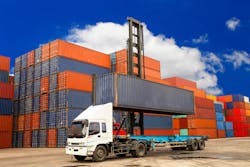A new report found that overall U.S. business logistics costs rose 11.4% last year to $1.64 trillion, equal to 8% of the gross domestic product and a jump of 50 basis points over 2017.
The logistics industry is “at a new crossroads after toughing out the steep grade of last year’s constrained capacity and rising prices,” according to the 2019 State of Logistics report from the Council of Supply Chain Management Professionals (CSCMP). It is presented by Penske Logistics and authored by A.T. Kearney.
Business inventory costs led the way with a 13.2% increase, a 4.6% year-over-year rise. Though transportation costs rose by 10.4% percent increase, certain modes saw even more significant spikes, including intermodal (28.7%) and private fleets (13.1%)
A wide range of factors contributed to these increases, starting with a strong job market that pushed wages hire, leading carriers and warehouses to raise prices on shippers to recoup the higher expenses.
As a result, shippers generally exceeded their 2018 logistics budgets, forcing them to tweak their business models to maintain capacity and control costs.
“As we predicted over the last two years, uncertainty became a steep grade,” the report said. “Carriers and shippers faced a choice: to either slog through it with conventional tactics or engage with opportunities to do something different, something better. More and more are trying the latter approach and are reaping the rewards.”
Shipping activity was “especially intense” in the fourth quarter of 2018 on concerns related to trade tensions between the United States and China. As a result, business inventory reached an all-time high of $2.75 trillion.
The report also found the growth in online shopping and faster shipping options continue to fuel gains for motor carriers and other freight haulers. E-commerce is “requiring big investments in supply chains that must be nimble and flexible in new ways,” the report said.
Among various sectors:
- In the parcel/last-mile space, Amazon continued to raise and train expectations to counteract brick-and-mortar advantages for compressed delivery windows, generating significant excitement for some and challenges for many.
- Freight forwarders remain profitable, thanks to a focus on customer service amid continually rising levels of trade.
- Cost pressures and last-mile challenges for third-party logistics companies are creating increasing demand for solutions and elevating some providers to a more strategic role.
- Industrial warehouse/distribution net absorption across the United States rose 16.8% over the previous year to an all-time high of 284.9 million square feet (msf) in 2018. It has topped 240 msf for five consecutive years, the longest run on record. Same-day and one-day shipping options are also reasons that inventory locations are moving closer to the consumer.
The report projected that even if there is an economic slowdown during the second half of the year, e-commerce growth, lower fuel prices and technology-driven efficiency gains should “could bode well for logistics.” That could materialize through an easing of capacity shortages, which would help slow price increases “that bedeviled shippers.”
Looking ahead into the next decade, the report concluded that “logistics is certainly on the cusp of technological change. New solutions could transform nearly every sector, from driverless trucks to automated warehouses to blockchain-enabled collaboration, although some of these developments are years away.”
About the Author
Neil Abt
Neil Abt is a former FleetOwner editor who wrote for the publication from 2017 to 2020. He was editorial director from 2018 to 2020.
